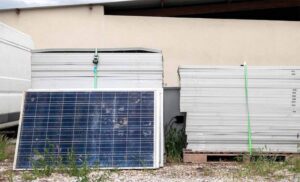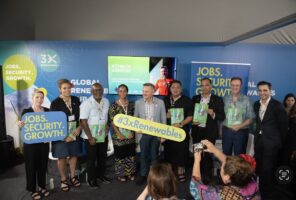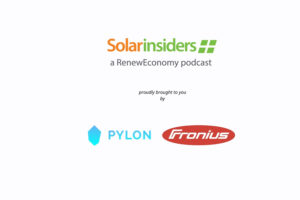Jeremy Grantham, the former chairman and chief investment strategist for the $100 billion funds manager GMO Capital is known as a contrarian. But his quarterly investment newsletters are eagerly awaited, because they usually give some fascinating insight into some of the big themes that affect investments.
His latest, distributed to his investors in July but only recently publicly released, is worth a read in full. It focuses on the impending food crisis, and also how the climate issues and the energy issues are interlinked.
It’s a long document, so here we are just going to excerpt some of the key points he makes about energy. Remember, Grantham has no particular interest in one energy source of another, nor does he belong to any think tank that has a particular ideological bent. He is just responsible for $100 billion of someone else’s money and wants to know the best place to put it. (The answer appears to be farming stocks and other resources, if only for the anticipated price spikes).
One of his key themes is that the shale gas boom may buy some time, mainly for the US, but “seems more likely to create complacency” and continued dependence on hydrocarbons. He says this will have a slip-back effect in the longer term, because it will lead to yet higher prices and shortages that will impact global growth and even the viability of modern, rather fragile, economies.
“On paper… the energy problem can be relatively easily addressed through very large investments in renewables and smart grids,” he writes. “Those countries that do this will, in several decades, eventually emerge with large advantages in lower marginal costs and in energy security. Most countries including the US will not muster the political will to overcome inertia, wishful thinking, and the enormous political power of the energy interests to embark on these expensive programs. They risk being left behind in competitiveness.”
That seems a pretty clear message, and maybe one that Australia’s politicians should absorb. But while the energy problem make seem simple to solve on paper, in reality it is a different prospect.
“All it takes is real leadership from our leaders; common sense from the general public; a willingness of hydrocarbon interests to back off from politics and propaganda and a herd of flying pigs! We need to build a very large, very smart grid, covering the whole of the US and one day perhaps including Canada. Among many tricks, it needs to be able to reach into smart homes and turn off the refrigerators and so on for a few minutes when needed.
“It is, in fact, all state-of-the-art already and in the 10 or 20 years it would take to build, the technology and engineering would no doubt greatly improve, given the great scale, helping to drive down the cost. Behind the grid we would need a truly massive investment in storage technologies and all renewables, especially solar and wind power. Solar costs have unexpectedly crashed in the last three years, down by over two-thirds, and finally today, in ideal conditions (even without coal carrying its full environmental costs), solar is competitive.’
Grantham says that, in a happy variant of Moore’s Law, this fall in solar costs will continue. So will the fall in wind power costs. But the costs of hydrocarbon energy of all kinds will rise. The cost of a new grid would be cheaper as a percentage of GDP than the Manhattan project, and even if it took 20-30 years to build, the marginal costs of operating and maintaining such a system would cross the rising costs of the current grid long before then.
“By 2050,” he says, “cheap hydrocarbon sources will be a distant memory. Electric grids based solely on hydrocarbons would by then, after desperate struggles and brownouts, likely have turned totally black and economies based on such grids would be under very severe stress. If I’m wrong in this assertion for some countries, simply add 10 or 20 years onto the timeframe.”
The danger of complacency driven by the new reserves of natural gas and extra oil from new drilling technology could allow Germany and others, possibly including China, to forge ahead with renewables until they dominate these new, relatively job-intensive industries and eventually end up with much lower marginal costs. “The major disadvantage of all of these extra (oil and gas) reserves, though, is that they will give us more rope with which to hang ourselves by frying the planet.”
He notes recent estimates by Cornell University, which he hopes are preliminary and mis-measured, of almost 8 per cent of fracking gas leaks from drill to stove burner. Anything more than 4 per cent (and it may be as little as 3 per cent) makes natural gas even more dangerous to a warming planet than coal. “Unlike other environmentalists, I worry less about other of the several negative effects of fracking: boiling the planet makes other negatives seem to me relatively inconsequential.”
He says China has been in a “class of its own” in taking seriously this topic of future availability of resources. “It has a long Confucian tradition of thinking very long term and its politicians do not have to worry about being re-elected or about voters and funders as much as ours do. My colleagues worry that the Chinese save and invest too much, approximately half of all their income, a level never before reached in history.
“But for undertaking a completely renewable energy system, what a set-up! If the Chinese feel they must maintain a 50 per cent capital spending ratio (or at least come down gracefully to avoid an outright depression), there are few projects big enough to both absorb the giant quantities of money available and have a good return on investment at the societal level in the long term. Building a renewable energy system achieves both aims.
“As a first mover they would quickly be able to build fewer coal utilities and, eventually, none. In 30 or 40 years they could phase out the last of them and stop slowly poisoning their urban residents while at the same time helping to stop slowly cooking the Earth.
The Chinese are already becoming leaders in wind and solar power construction and research. At much higher scale, their cost advantages would be hard to match, and if a renewable energy system were to be completed, their biggest long-term worry of all – energy security – would be gone.
“Compare their problem – ‘How do we spend all of our money?’ – with ours – ‘How do we pay back all of our debts?’ – and you can see why our hurdles are so much higher. It will, in comparison, need much more heroic leadership from us and plenty of those flying pigs. In the meantime, a major Chinese effort would be both a great example and a commercial goad to encourage others to follow. Go China!
Grantham also writes of the need to pursue R&D and financial encouragement for other promising renewables, such as algae, and even thorium based nuclear. But he says the greatest need for research is in power storage, which he says will become by far the weakest economic link in the desired renewable energy system.
“There are almost weekly announcements of new, ingenious approaches, but they seem always to be just around the corner. This would be a good area to have some of that “infinite capacity of the human brain” one hears so much about from the perma- optimists, and for once even I, a cheerful realist (which is no mean feat!), believe there will indeed be, eventually, some real breakthrough, at least in cost if not heavy science. It would certainly be helpful.”
Grantham concludes by observing that it is impossible to have exponential growth on a finite planet … “but no politicians (understandably) and almost no economists (almost unbelievably) will deal with this topic. The longer we delay in facing up to resource shortage, especially the need to go to renewables, the more severe the problem becomes. For example, by the time hydrocarbon prices go “critical,” some countries may not have the capability – political, social, or economic – to meet the substantial investments required and they will be left more or less permanently floundering behind.”
Grantham suggests the reasons for delay and even denial are varied. In the US, some politicians are understandably desperate to protect jobs, in the short term, in their state. In return for so doing, some receive help from hydrocarbon interests in getting re-elected.” They, the hydrocarbon companies, are in turn protecting the value of their huge current and future reserves in the ground, which often represent all of their market value. They also presumably feel that they are acting in their shareholders’ interest, which interest is interpreted in the currently fashionable and extremely narrow sense of maximising intermediate-term profits.
“Some delayers are libertarians who just hate government intervention regardless of the facts or circumstances. But far, far more numerous are the ordinary people who would just dearly love for everything to work out well and the future to be as easy as it used to be in the good old days. But thinking and hoping will not make it so, and delay and denial are dangerous, even potentially lethal, games to be playing.”







